Two Saturdays in January
Held a week apart, pro-choice, pro-life rallies draw thousands
At the annual Texas Rally for Life on Jan. 27, pro-life marchers were met with counterprotesters who chanted slogans supporting a women’s right to choose and autonomy over their own bodies. Pro-life and pro-choice activists yelled back and forth through a chain of policemen separating the two groups. Photo by Emma Baumgardner.
As the discussion over women’s rights dominates politics throughout the state and country, Texans continue to remember a landmark decision in the women’s rights movement. In 1973, the Supreme Court case Roe v. Wade made headlines throughout America as abortion was legalized in a 7-2 decision. At the time, the court comprised nine male judges. This year marks the 45th anniversary of the decision, which continues to impact politics on a state and national level. To both celebrate and contest the decision, separate pro-choice and pro-life rallies were held on Capitol grounds in Austin just seven days apart from each other.
Texans in particular tend to follow the issue closely, with politicians on both sides of the aisle fighting to pass legislation that supports their ideology. For those who contest the Roe v. Wade decision, access to abortion isn’t an issue of women’s rights, it’s an issue of human rights in general. Organizations such as the Texas Alliance for Life work to spread this belief through public outreach and by helping pass legislation that limits access to abortion. Deirdre Cooper works for the Texas Alliance for Life, or TAL, as a public policy analyst. She helped to promote the Texas Rally for Life, a TAL event held on Jan. 27.
“Abortion has nothing to do with women’s rights because abortion is a violation of the most basic human right: the right to life,” Cooper said in an email to The Shield. “Women, and men, have the right to life, regardless of size, age or location. That includes within the womb. Many women have abortions precisely because they feel they have no freedom and no other choice. Women’s rights advocates should care enough about women that they want to help them to truly have a choice: to support them in their choice for life, to parent or to place for adoption, to come alongside women in difficult situations and say, ‘You can do this! We believe in you and we will help you!’ That would be true empowerment for women.”
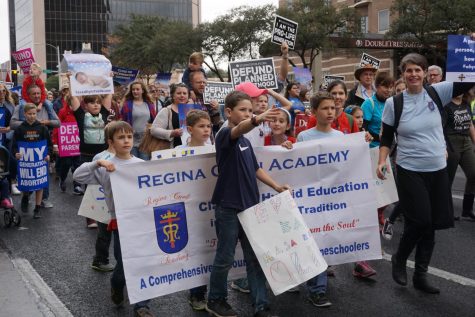
According to Cooper, the goal of the Jan. 27 rally was to reaffirm Texas’s pro-life leaning. The rally has been put on by the Texas Alliance for Life annually since the late ’80s in order to remember and contest the Roe v. Wade decision.
Even though stances on abortion are used to support specific party platforms in the public sphere, those who advocate both sides are not necessarily affiliated with a political party.
“TAL is a nonpartisan organization,” Cooper said. “We are happy to work with anyone who wants to work with us to pass strong pro-life laws. There are still several pro-life Democrats in Texas, and we are happy to work with them. Abortion should not be a partisan issue, it is a human rights issue, and we hope for a day when every elected official, regardless of party, is pro-life.”
The rally began off of 17th Street and Congress Avenue. There, people arrived from all across Texas. Youth church groups and religiously affiliated schools bussed in kids from as far away as Corpus Christi. Aaron Garcia, a high school student, could be seen walking around the rally holding a life-size cardboard cutout of the Pope.
“I came here with my school just to really support my school,” Garcia said. “St. John Paul Second High School from Corpus Christi has been doing this for several years already, and we’ve been leading it, so it’s just real nice to keep it going.”
Those attending the rally had varying opinions on whether there are exceptions where abortions should be allowed. While many held the idea that abortion should be allowed in situations of rape and incest, others held signs calling for the immediate eradication of the law, regardless of a pregnancy’s circumstances. Sheryl, who attended the rally with her family, supports a more complete abortion ban.
“We’re here today to advocate for the abolition of abortion,” Sheryl said. “Our anti-abortion laws don’t work in stopping abortions; they actually only stop less than 1.8 percent of the abortions, so the pro-life movement hasn’t been effective in ending abortions. For over 40 years, they’ve allowed over 65 million children to be murdered through incremental legislation. So, we’re for the immediate illegalization and criminalization of abortion.
“Throughout the pro-life movement, there’s a refusal to call abortion a sin and a refusal to call it murder. We believe that it is the intentional, premeditated killing of a human being, and that the mother is a perpetrator rather than a victim, and we think that they should be prosecuted as such, all parties involved.”
Some marchers wore Trump hats and shirts, showing their support for the current administration. One man, who wished to remain anonymous, carried a black-and-white American flag with a lone blue stripe, which is a symbol of support for the Blue Lives Matter movement.
“I’m here to stand in solidarity with the fetuses that can’t speak,” he said.
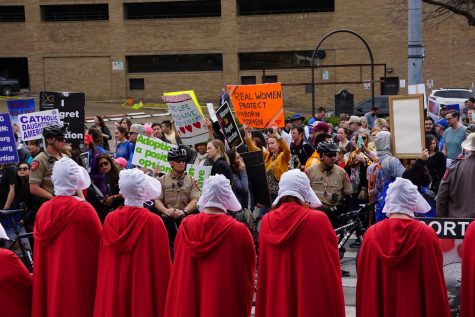
The rally began with a march to the Capitol, in which women pushed strollers down the streets, and preachers led sermons in the crowd. At the Capitol, a small group of protesters waved signs voicing support for the pro-choice movement. The Texas Handmaids, a volunteer group of women dressed in the robes similar to women in the book The Handmaid’s Tale by Margaret Atwood, stood in silent protest at the south entrance to the Capitol. Marchers yelled back and forth while a line of policemen separated the two groups. Steve Sanchez, a pastor from Johnson City, stood behind the crowd, yelling to address the protesters.
“And whosoever believes it shall not perish without everlasting life,” Sanchez said. “While we were yet sinners, Christ died for us. We urge you, we beg you, we plead with you in the name of Jesus and in love.”
Speakers at the rally included Texas governor Greg Abbott, who talked about declaring Jan. 22 as a “sanctity of life day.”
“We cannot get complacent,” Abbott said in a speech to the crowd. “Together we will stand our ground, and we will not let that happen. We will continue to give voice to the voiceless.”
The Texas March for Life was held only seven days after the pro-choice Roe v. Wade Rally. The Roe v. Wade Rally attracted more Austin residents and fewer visitors and was a continuation of the Women’s March that took place a year ago. Sarah Richardson and her daughter Tula marched to show their support for the women’s rights movement.
“We wanted to honor the memory of the march last year, which was one of the most moving experiences of our lives,” Sara Richardson said. “One year later, and we’re still here.”
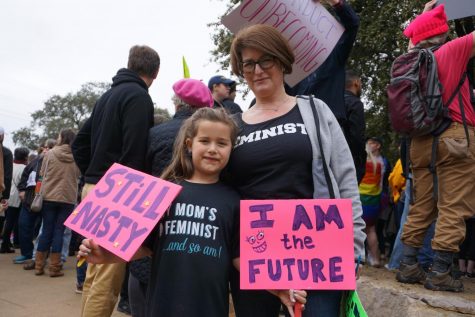
Another rally attendee, who identified herself only as Lisa, took part in the march in order to exercise her right to stand up for her beliefs.
“If you don’t, [march] then history’s going to pass you by. People take for granted the freedom that we have to effect change and to be heard. Not everybody has that, and we need to use it. Use it or lose it, you know?”
The rally and march were put on by the Texas Reproductive Rights Rally, or TRRR. Andrea Hughes, the group’s president, was inspired to start the organization after attending Wendy Davis’s 2013 filibuster of pro-life Senate Bill 5. Hughes listened arguments made on the Senate floor, eventually forming an opinion based on the testimonies given by both sides.
“The thing that really struck me is that there was consistently one side that resorted to fear, and there was one side that resorted to truth,” Hughes said in an interview with The Shield. “I’m always going to end up siding with truth.”
Hughes aims to mobilize the public to engage the political process and to speak up for the issues they care about.
“What I’m hoping to do with Texas Reproductive Rights Rally is to connect people and to empower people to get across the message that anyone can enter the world of activism and make a difference,” Hughes said. “I think that my main interest is in mobilizing the voter base at a grassroots level and getting people impassioned about the things they care about, showing them that you can literally just walk into the Texas Capitol, talk to a politician, and make an impact.”
At the rally, speakers stood on the front steps of the Capitol, sharing their stories and their contributions to the movement in state government. Speakers at the rally included state representative Donna Howard and women’s rights activist Wendy Davis.
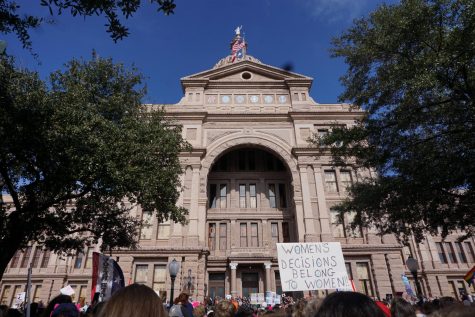
“Unless and until we can control our bodies and decisions that are made about them, we won’t ever be able to fully achieve the equal opportunities that should be available for each and every one of us,” Davis said. “It’s something that we all have a vested interest in. Where women are successful, we’re all successful, and we should be standing alongside each other and fighting for that equality of opportunity just as we would any other person in this country. No matter the resistance we meet in fighting for our reproductive rights and so many of the other things that we care about, if we can just own the power of our own voice, we will be a part of creating the kind of movement that is ultimately going to overwhelm that opposition and is going to realize change.”
Behind the speakers, Peace Costanzo, known for standing in front of the Capitol throughout the year dressed as Lady Liberty, proudly held a pro-life sign for all to see.
“I believe in the sanctity of life,” Costanzo said. “I remember being in my mother’s womb, and I believe that there are more viable options than abortion. You have to take particular steps to protect yourself.”
Even though her ideology differed from the crowd surrounding her, marchers stopped to pose for pictures with her and listen to her story.
She addressed others with the same formality as the costume she wore, holding her head dignified in silent protest.
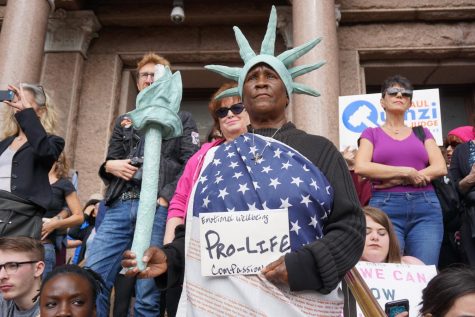



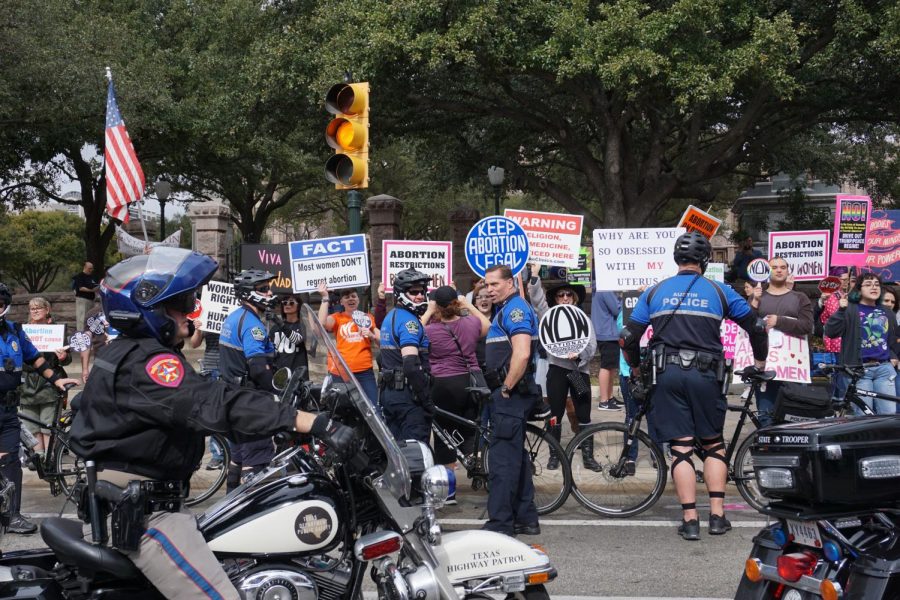
![With the AISD rank and GPA discrepancies, some students had significant changes to their stats. College and career counselor Camille Nix worked with students to appeal their college decisions if they got rejected from schools depending on their previous stats before getting updated. Students worked with Nix to update schools on their new stats in order to fully get their appropriate decisions. “Those who already were accepted [won’t be affected], but it could factor in if a student appeals their initial decision,” Principal Andy Baxa said.](https://macshieldonline.com/wp-content/uploads/2024/04/53674616658_18d367e00f_o-600x338.jpg)
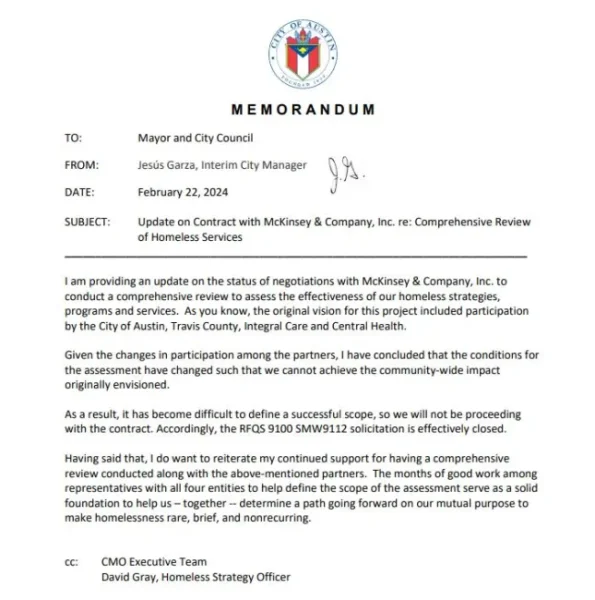
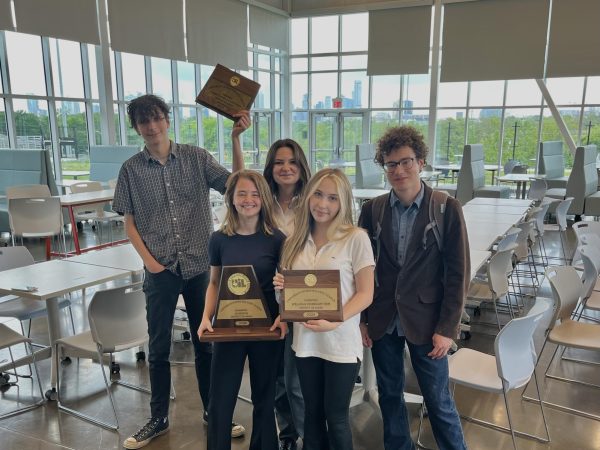
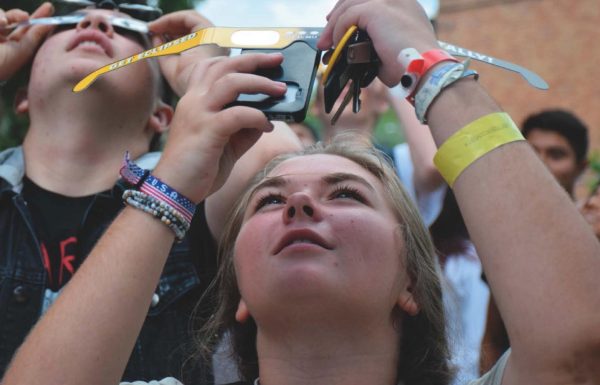
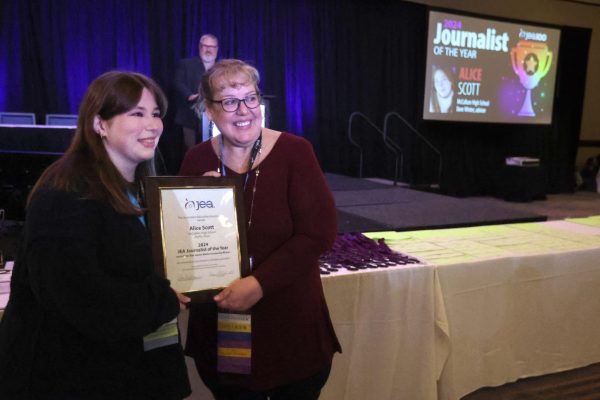
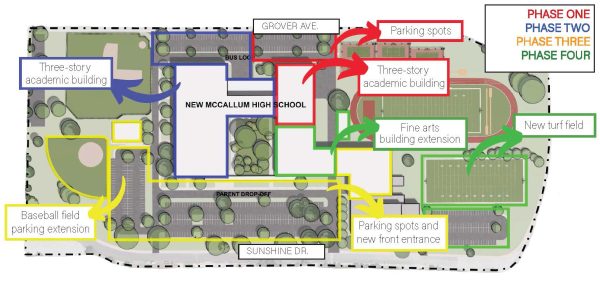



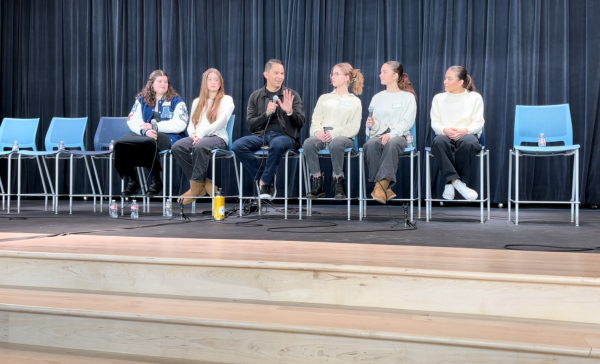

Jazzabelle Davishines • Mar 1, 2018 at 2:24 pm
It’s really interesting to hear both sides to this issue. Social media can often become an echo chamber if you only surround yourself with information you already believe, so it’s important to see different opinions.
Cole T. • Feb 28, 2018 at 2:20 pm
I find the anti-abortionist movement an idea that comes from an area of ignorance. They can’t decide what you do with your body. If you don’t want an abortion, that’s perfectly fine. If you want an abortion, that’s also ok. They argue that it’s not your body but both of yours (referring to you and the baby’s), but the baby doesn’t have an active conscience of its own until it comes out of the womb. Until then, it’s effectively a tumor of the mother. If the mother doesn’t want a baby or can’t afford one, then THEY should decide, not some christian with a tin foil hat.
Kristen T. • Feb 22, 2018 at 11:50 am
I appreciate hearing both the pro-life and pro-choice arguments in one story. Also, those are some fantastic pictures!